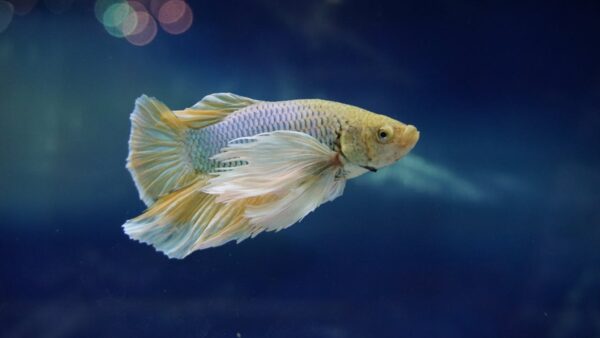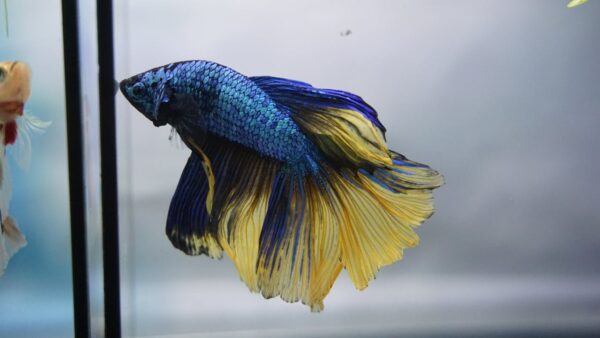Betta fish are beloved for their beauty and relatively low maintenance requirements. However, these stunning creatures can experience stress, leading to health issues and decreased lifespan. As a responsible pet owner, it’s essential to understand how to help a stressed betta fish.
Through this article, we’ll provide detailed information on the causes and signs of stress in bettas and practical advice on creating a stress-free environment.
| Information Chart | Betta Fish |
| Scientific Name: | Betta splendens |
| Family: | Osphronemidae |
| Care Level: | Beginner |
| Temperament: | Generally peaceful. Males are highly territorial and are extremely aggressive towards other males. Females can be kept together with proper tank size. |
| Color: | Vibrant red, green, blue, yellow, white, black, and metallic sheens. Their fins can also be of various shapes and sizes. |
| Lifespan: | 5 years with proper care |
| Size: | Up to 3 inches |
| Diet: | Insectivores. Accepts flakes, small pellets, and live worms. |
| Minimum Tank Size: | 5 gallons for a single Betta. |
| Temperature: | 78°F – 82°F (25°C – 28°C) |
| WaterConditions: | pH: 6.5 to 7.5 Soft water. |
| Tank Mate Compatibility | Peaceful community fish of similar size. |
Table of Contents
What Happens If Your Betta is Stressed?

Stress is a silent killer in aquarium fish, including your Betta. It works as a slow poison, making them susceptible to various issues and diseases. Here is a breakdown of how stress affects your fish and its health:
Suppresses Immune System
Consistent stress in an aquarium environment releases extreme cortisol levels in your Betta’s blood, disrupting the production of white blood cells and compromising your Betta’s natural immunity. It leaves your Betta vulnerable to the bacteria, fungus, and parasites always present in the tank at low levels. It may result in life-threatening diseases such as ich, fin rot, and swim bladder disorder.
Organ Damage
Chronically elevated stress hormones can damage internal organs like the kidneys and liver. Prolonged exposure to existing stressors may permanently damage the organs, jeopardizing your Betta’s quality of life and bringing their demise sooner than expected.
Reproductive Problems
Breeding Bettas, already a challenging task, becomes even more difficult when stress is introduced into the tank. Stressed fish may stop breeding or produce unhealthy offspring.
Less Tolerant to Environmental Changes
Stress makes fish less adaptable to fluctuations in water quality, temperature, or tank mates. Your Betta may also find it difficult to adjust to water changes, diet variations, and the introduction of new tank mates.
Also Read: 15 Fish With Big Lips – Photos & Facts
Signs of Stress in Betta Fish
Betta fish are sensitive creatures that love to explore their environment and exhibit their colorful flowing fins. When under stress, however, they show an array of behaviors and signs that are deemed unusual. As a Betta owner, keep an eye out for these signs in your tropical friend:
Changes in Behavior
Behavioral shifts are the most typical sign of stress in Bettas. In addition to hiding and being withdrawn, here are some changes that you may notice:
- Lethargy: A stressed Betta may become unusually inactive, spending most of its time resting at the bottom of the tank or hiding.
- Erratic Swimming: Stress can cause your Betta to swim erratically, darting around the tank or rubbing against surfaces.
- Loss of Appetite: A stressed Betta may refuse food or eat less than usual. Constipation is also an obvious sign of stress.
Physical Symptoms
Similar to us, stress directly correlates with some visible physical symptoms in Bettas. These include:
- Clamped Fins: Your Betta may hold their fins close to its body when stressed, a condition known as clamped fins. It usually happens against poor water conditions.
- Fin Damage: Stress can lead to fin rot or tearing through a compromised immune system. It is often exacerbated by poor water quality or aggressive tank mates.
- Weight Loss: Chronic stress can result in significant weight loss and a weakened appearance. The weight loss is often accelerated by a loss of appetite and lethargy.
Changes in Coloration
The most apparent sign of stress is your Betta’s changed coloration. This includes:
- Faded Colors: Betta fish often lose their vibrant coloration when stressed, appearing duller than usual. Fins usually start losing their colors first.
- Stress Stripes: Female Bettas, in particular, may develop horizontal stress stripes along their bodies. Improving water quality and removing stressors like offensive tank mates and water quality problems often resolve the issue.
Also Read: Columnaris In Bettas (Cotton Wool Disease Care & Cure)
Causes of Stress in Betta Fish

Now that we’ve learned about the signs of a stressed Betta, it necessitates knowing the causes of the same. In this section, we’ll discuss the reasons behind your Betta showing signs of stress.
Poor Water Quality
Poor water quality can result from inadequate filtration, infrequent water changes, and overfeeding, leading to waste accumulation. The situations may also occur by using unfiltered tap water, not dechlorinating the water, and using improper substrates and plants.
Water quality is a critical factor in the health of any fish, and Bettas are no exception. High levels of ammonia, nitrites, and nitrates can be toxic and stressful for Betta fish.
Inadequate Tank Size
Betta fish are often kept in small bowls or tanks, which can be highly stressful for them. In case you’ve kept your Betta in a similarly confined environment, consider moving them to a larger holding. The minimum recommended tank size for a single Betta fish is 5 gallons.
Bettas need enough space to swim and explore. A tank that is too small can limit their movement, leading to boredom and stress. While Bettas can live alone, they do better in community tanks with a few similar-sized, non-aggressive fish species like guppies and neon tetra.
In our opinion, avoid guppies, as they may pose as threatening to your male Betta due to similar coloration and appearance.
Improper Tank Mates
Bettas see their tank, at least a portion of it, as their domain. Introducing territorial tank mates can be perceived as an invasion and cause defensive behavior, inducing stress. Bettas are also known for their aggressive behavior towards other Bettas. Keeping multiple males in the same tank can lead to fights and severe stress.
Additionally, certain species of fish and invertebrates can nip at bettas’ fins, causing stress and injury. Flowing fins are a trigger for Bettas. Even fish with no intention of harming the Betta might nip at their fins, causing stress and potential infection. As Bettas are not always the fastest swimmers, bottom feeders or fast-moving fish may outcompete your Betta for food.
Overfeeding or Underfeeding
Betta fish have small stomachs, and overfeeding can overwhelm their digestive system. This leads to bloating, constipation, and swim bladder problems. The excess food also pollutes the water, creating a stressful environment with rapid ammonia spikes.
In contrast, a lack of proper nutrition weakens a Betta’s immune system, making them susceptible to diseases such as fin rot and fungal infections.
Feeding practices can significantly impact your Betta’s stress levels. Overfeeding can lead to poor water quality and digestive issues, while underfeeding can cause malnutrition and weakened immune systems. Both scenarios can contribute to stress.
Inconsistent Lighting
In the wild, Bettas experience a gentle transition from dawn to dusk with periods of shade from aquatic plants in the rice paddies. Their physiology and behavior are adapted to this predictable cycle.
In your artificial setting, Betta fish require a consistent light cycle to maintain their circadian rhythm. Inconsistent lighting, whether too much or too little, can disrupt their sleep patterns and lead to stress. A regular light schedule mimicking natural daylight is ideal. Abruptly turning on or off the lights may also cause stress.
Lack of Enrichment
A monotonous environment can cause boredom and stress in Bettas. Without hiding spots, plants, and other forms of enrichment, your Betta may become lethargic and exhibit signs of stress. Providing a stimulating environment is crucial for their mental health.
Also Read: What’s The Weight Of A Gallon Of Water In Pounds And Kilograms?
How to Create a Stress-Free Environment

With the reasons and signs of your Betta’s stress out of the way, let’s hop into solving the issue and offering your aquatic friend a stress-free environment.
Optimal Tank Setup
Here are the optimal tank setups for your Betta fish:
- Adequate Tank Size: Ensure your Betta’s tank is at least 5 gallons. Larger tanks provide more swimming space and a more stable environment.
- Substrate and Decor: Use a gentle substrate and include decorations such as caves, rocks, and plants to create hiding spots and exploration areas.
- Filtration: A reliable filter helps maintain water quality through bio-mechanical filtration. Choose a filter with an adjustable flow to avoid strong currents that can stress your Betta. Ensure that your filtration system is suitable to your tank size.
Water Quality Management
Water quality is among the mightiest of stressors for Bettas. Here is how to resolve it:
- Regular Water Changes: Perform weekly water changes of 25-30% to keep the water clean and free of harmful chemicals.
- Water Testing: Use a water testing kit to monitor ammonia, nitrite, nitrate, and pH levels. Aim for 0 ppm ammonia and nitrite, and keep nitrates below 20 ppm.
- Dechlorination: Always use a water conditioner to remove chlorine and chloramine from tap water before adding it to the tank.
Suitable Tank Mates
As mentioned, unsuitable tank mates can introduce stress into the tank. A general tank mate guideline for your Betta may involve:
- Avoid Aggressive Species: Choose peaceful tank mates that won’t nip at your Betta’s fins or provoke aggression.
- Single Male Betta: If you keep multiple Bettas, ensure they are housed in separate tanks or divided sections to prevent fighting.
- Compatible Species: Some betta-compatible species include snails, certain shrimp, and small, non-aggressive fish like neon tetras (in a large enough tank).
Proper Feeding Practices
Improper nutrition is another strong stressor for Bettas. To ensure proper feeding, follow this rules:
- Quality Diet: Feed your Betta a high-quality diet consisting of Betta pellets supplemented with occasional treats like bloodworms or brine shrimp.
- Feeding Schedule: Small amounts of food for 1-2 times a day should be adequate for your Betta. Feed only what they can consume within a few minutes. Avoid overfeeding to prevent water quality issues.
Lighting and Temperature Control
Being cold-blooded creatures and extremely dependent on the daylight cycle, Bettas thrive in environments with proper lighting and temperature control. Here is how to maintain them:
- Consistent Lighting: Provide 8-12 hours of light per day using an aquarium light on a timer. Avoid direct sunlight to prevent temperature fluctuations and algae growth.
- Stable Temperature: Maintain a water temperature between 76-82°F (24-28°C) using an aquarium heater. Sudden temperature changes can be very stressful for Bettas. If it’s too hot outside, increase surface-level agitation to keep the water cool.
Providing Enrichment and Hiding Spots
Bettas get bored and stressed due to it pretty easily. Keeping them entertained may involve:
- Live Plants: Include live plants like java moss, anubias, and betta bulbs to create a natural and stimulating environment.
- Hiding Spots: Add caves, driftwood, and other decorations to give your Betta places to hide and feel secure.
- Mirror Exercise: Occasionally, using a mirror can stimulate your Betta’s natural behavior and provide mental stimulation, but limit this to a few minutes a day to avoid additional stress.
Also Read: Do Goldfish Have Teeth?
Additional Tips for Betta Fish Care

While it’s relatively easy to manage Bettas, experienced input may help you be a better caregiver. Therefore, here are some additional tips to alleviate stress in your Betta tank:
- Observation: Regularly observe your Betta for any signs of stress or illness. Early detection might help you address potential issues.
- Quarantine New Additions: Quarantine new fish or plants before adding them to your Betta tank to prevent the introduction of complex diseases.
- Gentle Handling: Minimize handling and avoid tapping on the glass, as this can startle and stress your Betta.
- Regular Maintenance: Keep up with regular tank maintenance, including cleaning the filter and checking equipment for proper function.
Also Read: Sucker Fish: Care Tips, Tank Mates & More
FAQs
Monitor your Betta fish and see if it’s frantically swimming or is lethargic. Physiological changes, such as clamped fins, fin rot, and weight loss, are often signs of stress. Additionally, clamped fins faded colors, and stripes also indicate stress.
Depending on the stressor, offering a larger tank, managing optimum water quality, maintaining proper lighting and temperature, and introducing suitable tank mates should help the situation.
To relax your stressed Betta, change water frequently, monitor water parameters, and provide an optimal environment.
The Bottom Line
Creating a stress-free environment for your Betta fish is essential for their health and happiness. Hopefully, by referring to this article, you’ll now be able to recognize the early signs, take protective steps, and ensure that your Betta thrives.
No related posts.
